大学英语 精读第二册Test Yourself 1
- 格式:doc
- 大小:88.50 KB
- 文档页数:13
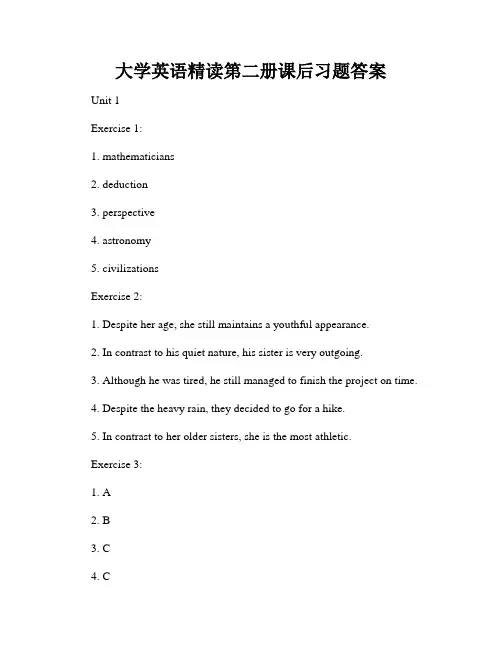
大学英语精读第二册课后习题答案Unit 1Exercise 1:1. mathematicians2. deduction3. perspective4. astronomy5. civilizationsExercise 2:1. Despite her age, she still maintains a youthful appearance.2. In contrast to his quiet nature, his sister is very outgoing.3. Although he was tired, he still managed to finish the project on time.4. Despite the heavy rain, they decided to go for a hike.5. In contrast to her older sisters, she is the most athletic.Exercise 3:1. A2. B3. C4. C5. AExercise 4:1. is derived from2. make sense3. consists of4. go beyond5. based onUnit 2Exercise 1:1. influential2. surgeon3. guarantee4. tremendous5. revealedExercise 2:1. Despite his busy schedule, he always finds time for his family.2. Although the road was blocked, they managed to find an alternative route.3. In contrast to the previous model, the new car is more fuel-efficient.4. Despite the difficulties, they never gave up.5. In contrast to her siblings, she is the most talented. Exercise 3:1. B2. B3. C4. C5. AExercise 4:1. take into account2. result in3. come up with4. play a role5. aim atUnit 3Exercise 1:1. exceptional2. rivals3. version4. translate5. perceptionExercise 2:1. Despite the storm, they managed to reach their destination safely.2. Although she was tired, she continued to study until late at night.3. In contrast to her classmates, she always arrives early to class.4. Despite the challenges, they remained determined to succeed.5. In contrast to her colleagues, she is the most experienced. Exercise 3:1. B2. A3. C4. A5. CExercise 4:1. focus on2. take for granted3. result in4. carry out5. lead toUnit 4Exercise 1:1. pioneers2. participants3. highlight4. efficiency5. potentialExercise 2:1. Despite their differences, they managed to work together effectively.2. Although she was nervous, she gave a flawless performance.3. In contrast to his friends, he prefers to stay at home and read.4. Despite the criticism, the artist continued to pursue his unique style.5. In contrast to her teammates, she is the most dedicated.Exercise 3:1. C2. B3. A4. C5. BExercise 4:1. result in2. pay attention to3. be exposed to4. go against5. give rise to以上是大学英语精读第二册课后习题的答案。
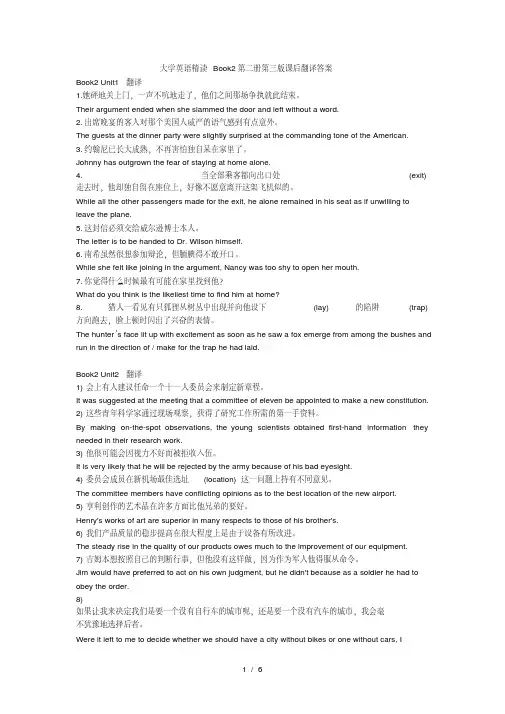
大学英语精读Book2第二册第三版课后翻译答案Book2 Unit1 翻译1.她砰地关上门,一声不吭地走了,他们之间那场争执就此结束。
Their argument ended when she slammed the door and left without a word.2. 出席晚宴的客人对那个美国人威严的语气感到有点意外。
The guests at the dinner party were slightly surprised at the commanding tone of the American.3. 约翰尼已长大成熟,不再害怕独自呆在家里了。
Johnny has outgrown the fear of staying at home alone.4. 当全部乘客都向出口处(exit) 走去时,他却独自留在座位上,好像不愿意离开这架飞机似的。
While all the other passengers made for the exit, he alone remained in his seat as if unwilling to leave the plane.5. 这封信必须交给威尔逊博士本人。
The letter is to be handed to Dr. Wilson himself.6. 南希虽然很想参加辩论,但腼腆得不敢开口。
While she felt like joining in the argument, Nancy was too shy to open her mouth.7. 你觉得什么时候最有可能在家里找到他?What do you think is the likeliest time to find him at home?8. 猎人一看见有只狐狸从树丛中出现并向他设下(lay) 的陷阱(trap) 方向跑去,脸上顿时闪出了兴奋的表情。
The hunter’s face lit up with excitement as soon as he saw a fox emerge from among the bushes and run in the direction of / make for the trap he had laid.Book2 Unit2 翻译1) 会上有人建议任命一个十一人委员会来制定新章程。
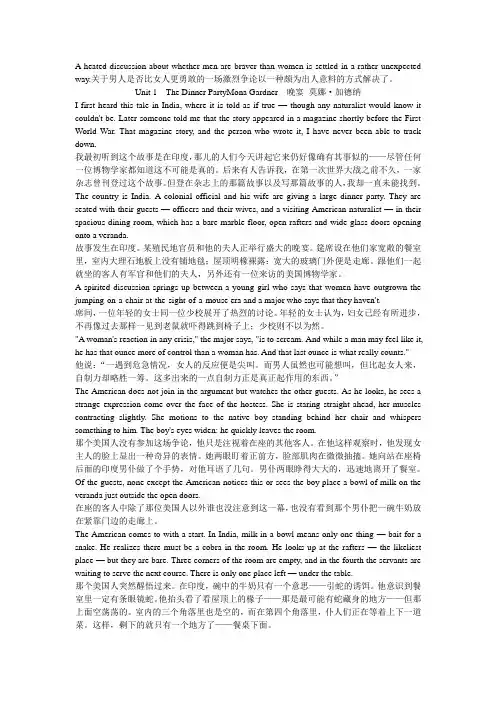
A heated discussion about whether men are braver than women is settled in a rather unexpected way.关于男人是否比女人更勇敢的一场激烈争论以一种颇为出人意料的方式解决了。
Unit 1 The Dinner PartyMona Gardner 晚宴莫娜·加德纳I first heard this tale in India, where it is told as if true — though any naturalist would know it couldn't be. Later someone told me that the story appeared in a magazine shortly before the First World War. That magazine story, and the person who wrote it, I have never been able to track down.我最初听到这个故事是在印度,那儿的人们今天讲起它来仍好像确有其事似的——尽管任何一位博物学家都知道这不可能是真的。
后来有人告诉我,在第一次世界大战之前不久,一家杂志曾刊登过这个故事。
但登在杂志上的那篇故事以及写那篇故事的人,我却一直未能找到。
The country is India. A colonial official and his wife are giving a large dinner party. They are seated with their guests — officers and their wives, and a visiting American naturalist — in their spacious dining room, which has a bare marble floor, open rafters and wide glass doors opening onto a veranda.故事发生在印度。
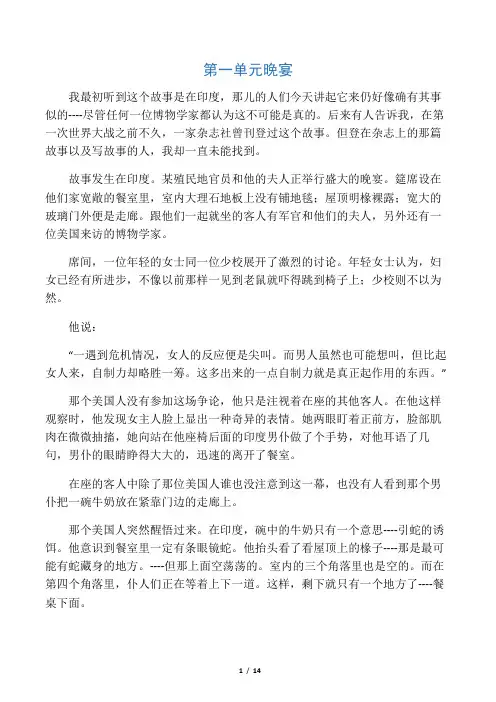
第一单元晚宴我最初听到这个故事是在印度,那儿的人们今天讲起它来仍好像确有其事似的----尽管任何一位博物学家都认为这不可能是真的。
后来有人告诉我,在第一次世界大战之前不久,一家杂志社曾刊登过这个故事。
但登在杂志上的那篇故事以及写故事的人,我却一直未能找到。
故事发生在印度。
某殖民地官员和他的夫人正举行盛大的晚宴。
筵席设在他们家宽敞的餐室里,室内大理石地板上没有铺地毯;屋顶明椽裸露;宽大的玻璃门外便是走廊。
跟他们一起就坐的客人有军官和他们的夫人,另外还有一位美国来访的博物学家。
席间,一位年轻的女士同一位少校展开了激烈的讨论。
年轻女士认为,妇女已经有所进步,不像以前那样一见到老鼠就吓得跳到椅子上;少校则不以为然。
他说:“一遇到危机情况,女人的反应便是尖叫。
而男人虽然也可能想叫,但比起女人来,自制力却略胜一筹。
这多出来的一点自制力就是真正起作用的东西。
”那个美国人没有参加这场争论,他只是注视着在座的其他客人。
在他这样观察时,他发现女主人脸上显出一种奇异的表情。
她两眼盯着正前方,脸部肌肉在微微抽搐,她向站在他座椅后面的印度男仆做了个手势,对他耳语了几句,男仆的眼睛睁得大大的,迅速的离开了餐室。
在座的客人中除了那位美国人谁也没注意到这一幕,也没有人看到那个男仆把一碗牛奶放在紧靠门边的走廊上。
那个美国人突然醒悟过来。
在印度,碗中的牛奶只有一个意思----引蛇的诱饵。
他意识到餐室里一定有条眼镜蛇。
他抬头看了看屋顶上的椽子----那是最可能有蛇藏身的地方。
----但那上面空荡荡的。
室内的三个角落里也是空的。
而在第四个角落里,仆人们正在等着上下一道。
这样,剩下就只有一个地方了----餐桌下面。
他首先想到的是往后一跳,并向其他人发出警告,但他知道这样会引起骚乱,致使眼镜蛇受惊咬人。
于是他很快讲了一通话,其语气非常的威严,竟使得所有的人都安静了下来。
“我想了解一下在座的诸位到底有多大的克制能力,我数三百下----也就是五分钟----你们谁都不许动一动,动者罚款五十卢比,准备好!”在他数数的过程中,那二十个人一个个都像石雕一样蹲坐在那儿,当他数到“……二百八十……”时,突然从眼角处看到那条眼镜蛇钻了出来,向那碗牛奶爬去。
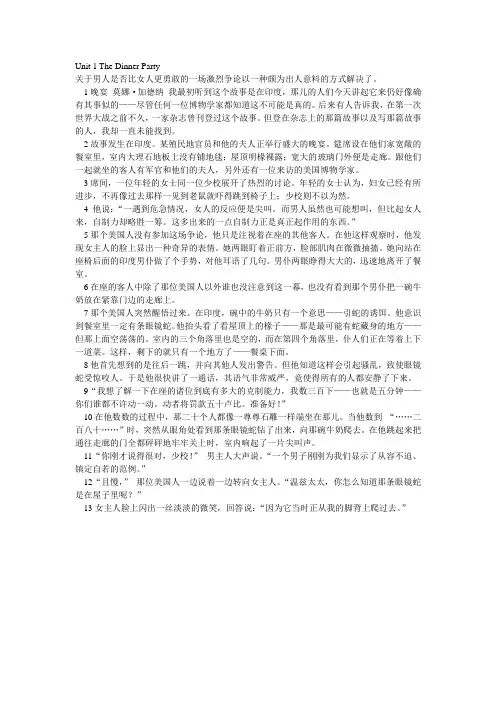
Unit 1 The Dinner Party关于男人是否比女人更勇敢的一场激烈争论以一种颇为出人意料的方式解决了。
1晚宴莫娜·加德纳我最初听到这个故事是在印度,那儿的人们今天讲起它来仍好像确有其事似的——尽管任何一位博物学家都知道这不可能是真的。
后来有人告诉我,在第一次世界大战之前不久,一家杂志曾刊登过这个故事。
但登在杂志上的那篇故事以及写那篇故事的人,我却一直未能找到。
2故事发生在印度。
某殖民地官员和他的夫人正举行盛大的晚宴。
筵席设在他们家宽敞的餐室里,室内大理石地板上没有铺地毯;屋顶明椽裸露;宽大的玻璃门外便是走廊。
跟他们一起就坐的客人有军官和他们的夫人,另外还有一位来访的美国博物学家。
3席间,一位年轻的女士同一位少校展开了热烈的讨论。
年轻的女士认为,妇女已经有所进步,不再像过去那样一见到老鼠就吓得跳到椅子上;少校则不以为然。
4他说:“一遇到危急情况,女人的反应便是尖叫。
而男人虽然也可能想叫,但比起女人来,自制力却略胜一筹。
这多出来的一点自制力正是真正起作用的东西。
”5那个美国人没有参加这场争论,他只是注视着在座的其他客人。
在他这样观察时,他发现女主人的脸上显出一种奇异的表情。
她两眼盯着正前方,脸部肌肉在微微抽搐。
她向站在座椅后面的印度男仆做了个手势,对他耳语了几句。
男仆两眼睁得大大的,迅速地离开了餐室。
6在座的客人中除了那位美国人以外谁也没注意到这一幕,也没有看到那个男仆把一碗牛奶放在紧靠门边的走廊上。
7那个美国人突然醒悟过来。
在印度,碗中的牛奶只有一个意思——引蛇的诱饵。
他意识到餐室里一定有条眼镜蛇。
他抬头看了看屋顶上的椽子——那是最可能有蛇藏身的地方——但那上面空荡荡的。
室内的三个角落里也是空的,而在第四个角落里,仆人们正在等着上下一道菜。
这样,剩下的就只有一个地方了——餐桌下面。
8他首先想到的是往后一跳,并向其他人发出警告。
但他知道这样会引起骚乱,致使眼镜蛇受惊咬人。
于是他很快讲了一通话,其语气非常威严,竟使得所有的人都安静了下来。
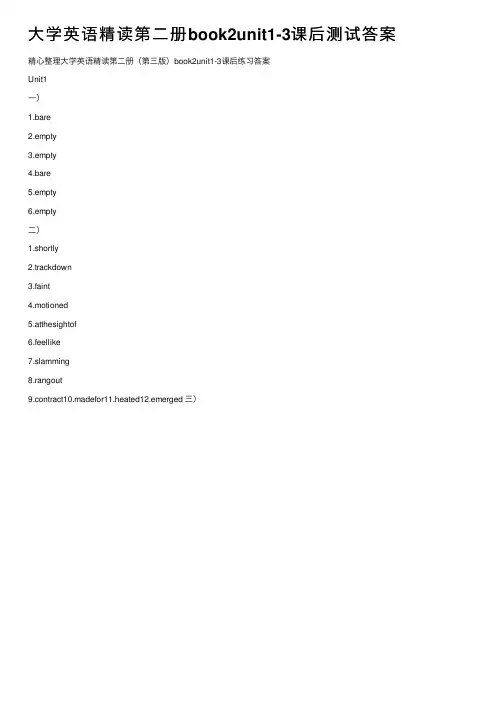
⼤学英语精读第⼆册book2unit1-3课后测试答案精⼼整理⼤学英语精读第⼆册(第三版)book2unit1-3课后练习答案Unit1⼀)1.bare2.empty3.empty4.bare5.empty6.empty⼆)1.shortly2.trackdown3.faint4.motioned5.atthesightof6.feellike7.slamming8.rangout9.contract10.madefor11.heated12.emerged 三)四)五)1.2.pigtailedgiftedbeardedpointedexperiencedagedskilleddiseased六)1.Thepeoplequestionedgaveverydifferentopinionsontheissue.2.Canyouseethemanclimbingonthatrock?3.Severaldayspassedbeforetheycameupwithasatisfactorysolutiontotheproblemsdiscussed.4.Wewerewokenearlybythesoundofthebirdssinging.5.Thechairmanmadeitclearthatthoseobjectingshouldexplaintheirreasons.6.Afteraday’swork,IfeltIhadlittleenergyleft.7.Iknewofsomeoftheathletestakingpart.8.Thesuccessobtainedsurprisedthosewhohadgivenuptheprojectasimpossible.七)1.Duringthetimethat2.Aslongas3.Although4.aslongas5.whereas6.Although7.whereas8.Although1.Theyfrightenedthechildintotellingthetruth.2.Hetrickedherintomarryinghimbypretendingthathewasthesonofamillionaire.3.Mytactlesswordsforcedtheoldgentlemanintobuyingsomethinghecouldnotpossiblyafford.4.Hefinallytalkedmeintoacceptinghisterms.5.Thegirlpersuadedherfatherintogivingupsmoking.6.Theirseverecriticismshockedherintorealizingherselfishness.⼋)九)⼗)1.2.3.4.5.6.南希虽然很想参加辩论,但腼腆得不敢开⼝。
![大学英语精读第二册课文翻译[1]](https://uimg.taocdn.com/76b801ef172ded630b1cb681.webp)
晚宴莫纳加德纳我最初听到这个故事是在印度,哪儿的人们今天讲起来仍好像确有其事似的--尽管任何一位博物学家都知道这不可能是真的。
后来有人告诉我,在第一次世界大战之前不久,一家杂志社曾刊登过这个故事。
但登在杂志上的那篇故事以及写那篇故事的人,我却一直未能找到。
故事发生在印度。
某殖民地官员和他的夫人正举行盛大的晚宴。
筳席设在他们家宽敞的餐厅里,室内大理石地板上没有铺地毯;屋顶明橼裸露;宽大的玻璃门外便是走廊。
跟他们一起就坐的客人有军官和他们的夫人,另外还有一位来访的美国博物学家。
席间,一位年轻的女士同一位少校展开了热烈的讨论.年轻的女士认为,妇女已经有所进步,不再像过去那样一见到老鼠就吓得跳到椅子上.少校则不以为然.他说:"一遇到危急情况,愤怒的反映便是尖叫.而男人虽然也可能想叫,但比起女人来,自制力却略胜一筹.这多出来的一点自制力正是真正起作用的东西.那个美国人没有参加这场争论,他只是注视着在坐的客人。
在他这样观察时,他发现女主人的脸上显出一种奇异的表情。
她两眼盯着正前方,脸上肌肉在微微抽搐。
他想站在座椅后面的印度男仆做了个手势,对他耳语了几句。
男仆两眼睁得大大的,迅速的离开了餐室。
在座的客人中除了那位美国人以外谁也没注意到这一幕,也没有看到那个男仆把一碗牛奶放在紧靠门边的走廊上。
那位美国人突然醒悟过来,在印度,碗中的牛奶只有一个意思--引蛇的诱饵。
他意识到餐室里一定有条眼镜蛇。
她抬头看了看屋顶上的橼子--那是最可能有蛇藏身的地方--但那上面空荡荡的。
室内的三个角落里也是空的,而在第四个角落里,仆人们正在等着上下一道菜。
这样剩下的就只有一个地方了--餐桌下面。
他首先想到的是往后一跳,并向其他人发出警告。
但他知道这样会引起骚乱,致使蛇受惊咬人。
于是他很快讲了一通话,其语气非常威严,竟使得所有的人都安静下来。
“我想了解一下在座的诸位到底有多大的自制能力,我数三百下--也就是五分钟--你们谁都不许动一动。
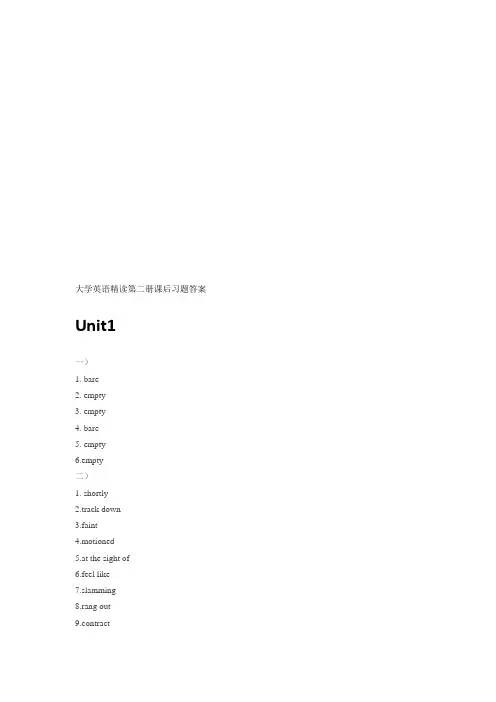
大学英语精读第二册课后习题答案Unit1一)1. bare2. empty3. empty4. bare5. empty6.empty二)1. shortly2.track down3.faint4.motioned5.at the sight of6.feel like7.slamming8.rang out9.contract10.made for11.heated12.emerged三)1. host2. sprang up/rang out3. impulse4. came to5. track down6. unexpected7. outgrow8. widened9. shortly10. emerge / spring up11. at the sight of12. made for13. crisis14. colonial四)1. Jimmy has outgrown the shirts his aunt made for him a few years ago.2. Does the doctor think the elderly lady is likely to survive the operation / it is likely that the elderly lady will survive the operation?3. The other day your cousin paid us an unexpected visit.4. Don't you see the nurse motioning us to be silent?5. Her face lit up with joy at his return.6. The sound of her footsteps grew fainter as she walked farther away.五)1.Additional advantageousAnxious conditionalCourageous curiousDangerous educationalEmotional famousIndustrial intentionalMedical mountionousMusical mysteriousNational occasionalPersonal practical2.Heated coloredpigtailed giftedbearded pointedexperienced agedskilled diseased六)1.The people questioned gave very different opinions on the issue.2. Can you see the man climbing on that rock?3. Several days passed before they came up with a satisfactory solution to the problems discussed.4. We were woken early by the sound of the birds singing.5. The chairman made it clear that those objecting should explain their reasons.6. After a day’s work, I felt I had little energy left.7. I knew of some of the athletes taking part.8. The success obtained surprised those who had given up the project as impossible.七)1. During the time that2. As long as3. Although4. as long as5. whereas6. Although7. whereas8. Although1. They frightened the child into telling the truth.2. He tricked her into marrying him by pretending that he was the son of a millionaire.3. My tactless words forced the old gentleman into buying something he could not possibly afford.4. He finally talked me into accepting his terms.5. The girl persuaded her father into giving up smoking.6. Their severe criticism shocked her into realizing her selfishness.1. Guests are to be back in the h otel by twelve o’clock.2. An investigation is to be made next week.3. I am to meet them at the airport.4. You are to finish your homework before you watch TV.5. The medicine is to be taken three times a day after meals.6. Bob and Susan are to get married in October八)1.hosts2.heated3.argument4.impluse5.shortly6.emerged7.slam8.crawled9.crisis1.corner2.attention3.noticed4.shining5.directed6.there7.bed8.snake9.its10.feet11.from12.however13.do14.as15.forward16.neither17.still18.if19.through20.floor21.pulling22.under23.cried24.out25.to26.where27.made28.eyes九)1.do the cooking3.hardly thought so3.settled down4.half expected5.equipment6.boiled over7.why things were so quiet8.burning9.greeted10.battlefield十)1.她砰地关上门,一声不吭地走了,他们之间那场争执就此结束。
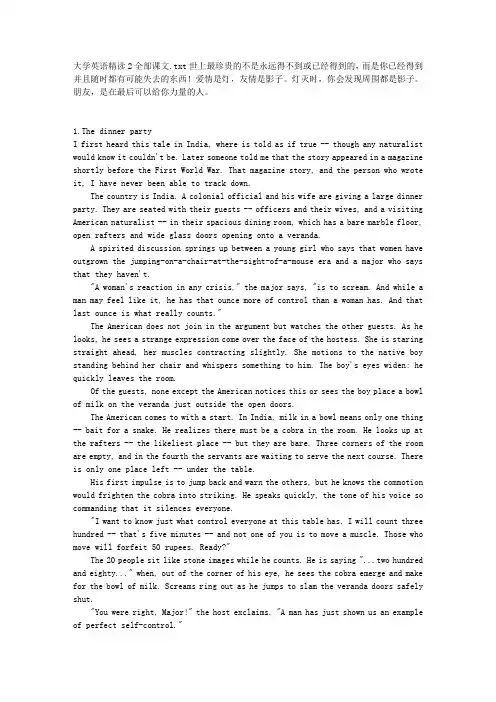
大学英语精读2全部课文.txt世上最珍贵的不是永远得不到或已经得到的,而是你已经得到并且随时都有可能失去的东西!爱情是灯,友情是影子。
灯灭时,你会发现周围都是影子。
朋友,是在最后可以给你力量的人。
1.The dinner partyI first heard this tale in India, where is told as if true -- though any naturalist would know it couldn't be. Later someone told me that the story appeared in a magazine shortly before the First World War. That magazine story, and the person who wrote it, I have never been able to track down.The country is India. A colonial official and his wife are giving a large dinner party. They are seated with their guests -- officers and their wives, and a visiting American naturalist -- in their spacious dining room, which has a bare marble floor, open rafters and wide glass doors opening onto a veranda.A spirited discussion springs up between a young girl who says that women have outgrown the jumping-on-a-chair-at-the-sight-of-a-mouse era and a major who says that they haven't."A woman's reaction in any crisis," the major says, "is to scream. And while a man may feel like it, he has that ounce more of control than a woman has. And that last ounce is what really counts."The American does not join in the argument but watches the other guests. As he looks, he sees a strange expression come over the face of the hostess. She is staring straight ahead, her muscles contracting slightly. She motions to the native boy standing behind her chair and whispers something to him. The boy's eyes widen: he quickly leaves the room.Of the guests, none except the American notices this or sees the boy place a bowl of milk on the veranda just outside the open doors.The American comes to with a start. In India, milk in a bowl means only one thing -- bait for a snake. He realizes there must be a cobra in the room. He looks up at the rafters -- the likeliest place -- but they are bare. Three corners of the room are empty, and in the fourth the servants are waiting to serve the next course. There is only one place left -- under the table.His first impulse is to jump back and warn the others, but he knows the commotion would frighten the cobra into striking. He speaks quickly, the tone of his voice so commanding that it silences everyone."I want to know just what control everyone at this table has. I will count three hundred -- that's five minutes -- and not one of you is to move a muscle. Those who move will forfeit 50 rupees. Ready?"The 20 people sit like stone images while he counts. He is saying "...two hundred and eighty..." when, out of the corner of his eye, he sees the cobra emerge and make for the bowl of milk. Screams ring out as he jumps to slam the veranda doors safely shut."You were right, Major!" the host exclaims. "A man has just shown us an example of perfect self-control.""Just a minute," the American says, turning to his hostess. "Mrs. Wynnes, how did you know that cobra was in the room?"A faint smile lights up the woman's face as she replies: "Because it was crawling across my foot."提问者:纯美素然 - 三级最佳答案检举晚宴我最初听到这个故事是在印度,那儿的人们今天讲起它来仍好像确有其事似的——尽管任何一位博物学家都知道这不可能是真的。

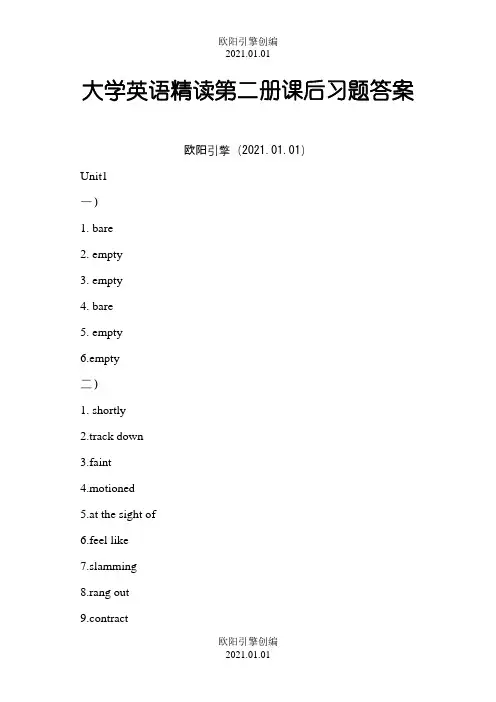
大学英语精读第二册课后习题答案欧阳引擎(2021.01.01)Unit1一)1. bare2. empty3. empty4. bare5. empty6.empty二)1. shortly2.track down3.faint4.motioned5.at the sight of6.feel like7.slamming8.rang out9.contract10.made for11.heated12.emerged三)1. host2. sprang up/rang out3. impulse4. came to5. track down6. unexpected7. outgrow8. widened9. shortly10. emerge / spring up11. at the sight of12. made for13. crisis14. colonial四)1. Jimmy has outgrown the shirts his aunt made for him a few years ago.2. Does the doctor think the elderly lady is likely to survive theoperation / it is likely that the elderly lady will survive the operation?3. The other day your cousin paid us an unexpected visit.4. Don't you see the nurse motioning us to be silent?5. Her face lit up with joy at his return.6. The sound of her footsteps grew fainter as she walked farther away.五)1.Additional advantageousAnxious conditionalCourageous curiousDangerous educationalEmotional famousIndustrial intentionalMedical mountionousMusical mysteriousNational occasionalPersonal practical2.Heated coloredpigtailed giftedbearded pointedexperienced agedskilled diseased六)1.The people questioned gave very different opinions on the issue.2. Can you see the man climbing on that rock?3. Several days passed before they came up with a satisfactory solution to the problems discussed.4. We were woken early by the sound of the birds singing.5. The chairman made it clear that those objecting should explain their reasons.6. After a day’s work, I felt I had little energy left.7. I knew of some of the athletes taking part.8. The success obtained surprised those who had given up the project as impossible.七)1. During the time that2. As long as3. Although4. as long as5. whereas6. Although7. whereas8. Although1. They frightened the child into telling the truth.2. He tricked her into marrying him by pretending that he was the son of a millionaire.3. My tactless words forced the old gentleman into buying something he could not possibly afford.4. He finally talked me into accepting his terms.5. The girl persuaded her father into giving up smoking.6. Their severe criticism shocked her into realizing her selfishness.1. Guests are to be back in the hotel by twelve o’clock.2. An investigation is to be made next week.3. I am to meet them at the airport.4. You are to finish your homework before you watch TV.5. The medicine is to be taken three times a day after meals.6. Bob and Susan are to get married in October八)1.hosts2.heated3.argument4.impulse5.shortly6.emerged7.slam9.crisis1.corner2.attention3.noticed4.shining5.directed6.there7.bed8.snake9.its10.feet11.from12.however13.do14.as15.forward16.neither17.still18.if19.through20.floor22.under23.cried24.out25.to26.where27.made28.eyes九)1.do the cooking3.hardly thought so3.settled down4.half expected5.equipment6.boiled over7.why things were so quiet8.burning9.greeted10.battlefield十)1.她砰地关上门,一声不吭地走了,他们之间那场争执就此结束。
大学英语精读第二册课文翻译(全)UNTH 2-1It is humorous essay. 这是一篇幽默的文章。
But after reading it you will surely find that the author is most serious in writing it.但是读过之后你将会发现作者写这篇文章的时候是很严肃的。
Is There Life on Earth? 地球上有生命吗?Art Buchwald阿特.布奇沃德There was great excitement on the planet of V enus this week. 金星上本周异常热闹。
For the first time V enusian scientists managed to land a satellite on the plant Earth, 那里的科学家首次成功地将一颗卫星送上了地球,and is has been sending back signals as well as photographs ever since. 从此卫星便一直不断地发回信号和照片。
The satellite was directed into an area know as Manhattan 卫星被发射到一个叫曼哈顿的地区(named after the great V enusian astronomer Prof. (它是用金星上伟大的天文学家曼哈顿教授的名字命名的, Manhattan, who first discovered it with his telescope 20,000 light years ago). 两万光年前是他首次用望远镜发现了该地区)。
Because of excellent weather conditions and extremely strong signals, 由于良好的天气条件以及高质量的信号,V enusian scientists were able to get valuable information 使得金星上的科学家们能够获得宝贵资料as to the feasibility of a manned flying saucer landing on Earth. 有关载人飞碟能否在地球上着陆。
大学英语精读(一)模拟试题(二)考生注意:1.考试时间:120分钟2.本套试卷共五道大题,满分100分。
- - - - - - - - - - - - - - - - - - - - - - - - - - - - - - - - - -答案Part Ⅰ. Vocabulary and Structure (每题1分,20小题,共20分。
)Directions: There are 20 incomplete sentences in this part .For each sentence there are four choices marked A、B、C、and D .Choose the one that best completes the sentence.1. He was pursuing his ______of collecting stamps for so many years.A、likeB、hobbyC、loveD、fun2. She has bought ______bananas for us.A、a pile ofB、a set ofC、a piece ofD、a bunch of3. Don't worry. I'll ______your house while you're on your trip.A、look atB、look aboutC、look afterD、look out4. I can't understand what he says;he must be ______.A、foreignB、outsideC、abroadD、external5. Please do not ______me when I am talking.A、interruptB、cutC、breakD、cross6. Electric trains have now ______steam trains in England.A、taken the place ofB、given place toC、changed places withD、taken their places of7. You may ______an aircraft light ______astar in evenings.A、mistake…forB、misunderstand…forC、misuse…forD、mistrust…for8. The children were ______ the teacher to tell them a story.A、longing forB、hoping forC、longing afterD、wishing for9. He is expected to ______some ideas after he considers the problem.A、come up withB、come out inC、come out ofD、come out with10. The train arrived two hours behind ______.A、dateB、planC、scheduleD、timetable11. The thief ran into the crowd and ______from sight.A、scatteredB、dissipateC、vanishedD、disperse12. ______my phone number in your diary before you forget it.A、Write forB、Write inC、Write downD、Write up13. ______asks to see the instructor,tell him or her to wait until 10:30.A、WhicheverB、WheneverC、WhoeverD、Whatever14. ______ I know him,______I like him.A、The better…the moreB、The better…the mostC、The less…the littleD、The more…the most15. And honestly I thought the fried chic ken was ______ .A、tasteB、delightfulC、interestingD、delicious16. Don't go to that shop-they will______you.A、beatB、teaseC、cheatD、teach17. It ______be a very prosperous town.A、is used toB、used toC、was used toD、has used to18. Sally ______before I had a chance to explain.A 、hung upB、hung backC、hang upD、hang back19. ______,I saw two planes flying over the tower.A、Looking overB、Looking downC、Looking aroundD、Looking up20. Before the end of his lecture,the professor may also ______time for the students to ask him questions.A、lay asideB、brush asideC、set asideD、put asidePartⅡ. (每题2分,10小题,共20分。
Unit 11.我们像在暖房里种花那样养孩子是错误的。
我们必须让他们接触各种社会问题,因为不久他们就将作为公民来应对这些问题。
It's wrong to hear our children the way we grow flowers in the greenhouse. We must expose them to all social problems because they will approach them as citizens very soon.2.随着时间的推移,我们不可避免地会越来越多地卷入国际商务。
而冲突必然会发生,因为国家之间总有不同的观点和利益。
With the passage of time we are inevitably increasing involved in international affairs. And conflicts are sure to occur because there always exist different views and interests among nations.3.我们为我们的成就而骄傲,我们有理由感到骄傲。
但是我们永远不能变得狂妄,不然我们就会失去我们的朋友。
We are proud of our accomplishments, and we have reason to be so. But we must never become arrogant. Otherwise we will lose our friends.4.信息现在唾手可得。
一个普通的电脑就能储存一个普通图书馆的信息。
Information is now immediately available. An average computer can store as much information as a small library dose.5.那家建筑公司没有资格操作这个项目。
现代大学英语精读第二版第二册课后练习答案参考答案(Units1—8)Unit OneKey to ExercisePreview:1 True or false1F 2T 3F 4F 5T 6F 7T 8T 9T 10TVocabulary4. Complete the sentences by translating the Chinese in the brackets1. differ2. differently, different3. difference4. serious, serious, seriously5. seriousness, seriously polluted6. Fortunately/ Luckily, pollution, seriously, pollute7. attention 8. attentively, attentive3 Fill in the blanks with the correct forms of the phrases and expressions.4 Translate the following sentences using words and expressions taken from the text.1. 他们利用我们求助无门的困境把我们公司接管了。
They took advantage of our helpless situation and took over our company.2. 虽然我们面前仍有困难,但我肯定我们中国人有智慧靠自己实现国家的和平统一。
Although there are still difficulties ahead of us, I am sure that we Chinese people will have the wisdom to bring abou t the peaceful unification of our country on our own.3. 只强调国内生产总值是错误的,它会引起很多严重问题。
大学英语精读第二册课后习题答案Unit1一)1. bare2. empty3. empty4. bare5. empty6.empty二)1. shortly2.track down3.faint4.motioned5.at the sight of6.feel like7.slamming8.rang out9.contract10.made for11.heated12.emerged三)1. host2. sprang up/rang out3. impulse4. came to5. track down6. unexpected7. outgrow8. widened9. shortly10. emerge / spring up11. at the sight of12. made for13. crisis14. colonial四)1. Jimmy has outgrown the shirts his aunt made for him a few years ago.2. Does the doctor think the elderly lady is likely to survive the operation / it is likely that the elderly lady will survive the operation?3. The other day your cousin paid us an unexpected visit.4. Don't you see the nurse motioning us to be silent?5. Her face lit up with joy at his return.6. The sound of her footsteps grew fainter as she walked farther away.五)1.Additional advantageousAnxious conditionalCourageous curiousDangerous educationalEmotional famousIndustrial intentionalMedical mountionousMusical mysteriousNational occasionalPersonal practical2.Heated coloredpigtailed giftedbearded pointedexperienced agedskilled diseased六)1.The people questioned gave very different opinions on the issue.2. Can you see the man climbing on that rock?3. Several days passed before they came up with a satisfactory solution to the problems discussed.4. We were woken early by the sound of the birds singing.5. The chairman made it clear that those objecting should explain their reasons.6. After a day’s work, I felt I had little energy left.7. I knew of some of the athletes taking part.8. The success obtained surprised those who had given up the project as impossible.七)1. During the time that2. As long as3. Although4. as long as6. Although7. whereas8. Although1. They frightened the child into telling the truth.2. He tricked her into marrying him by pretending that he was the son of a millionaire.3. My tactless words forced the old gentleman into buying something he could not possibly afford.4. He finally talked me into accepting his terms.5. The girl persuaded her father into giving up smoking.6. Their severe criticism shocked her into realizing her selfishness.1. Guests are to be back in the hotel by twelve o’clock.2. An investigation is to be made next week.3. I am to meet them at the airport.4. You are to finish your homework before you watch TV.5. The medicine is to be taken three times a day after meals.6. Bob and Susan are to get married in October八)1.hosts2.heated3.argument4.impulse5.shortly6.emerged7.slam8.crawled9.crisis1.corner2.attention3.noticed4.shining5.directed6.there7.bed8.snake9.its10.feet11.from12.however13.do14.as16.neither17.still18.if19.through20.floor21.pulling22.under23.cried24.out25.to26.where27.made28.eyes九)1.do the cooking3.hardly thought so3.settled down4.half expected5.equipment6.boiled over7.why things were so quiet8.burning9.greeted10.battlefield十)1.她砰地关上门,一声不吭地走了,他们之间那场争执就此结束。
第一单元The Dinner PartyMona Gardner I first heard this tale in India, where it is told as if true — though any naturalist would know it couldn’t be. Later someone told me that the story appeared in a magazine shortly before the First World War. That magazine story, and the person who wrote it, I have never been able to track down. The country is India. A colonial official and his wife are giving a large dinner party. They are seated with their guests — officers and their wives, and a visiting American naturalist — in their spacious dining room, which has a bare marble floor, open rafters and wide glass doors opening onto a veranda.A spirited discussion springs up between a young girl who says that women have outgrown the jumping-on-a-chair-at-the-sight-of-a-mouse era and a major who says that they haven’t.“A woman’s reaction in any crisis,” the major says, “is to scream. And while a man may feel like it, he has that ounce more of control than a woman has. And that last ounce is what really counts.”The American does not join in the argument but watches the other guests. As he looks, he sees a strange expression come over the face of the hostess. She is staring straight ahead, her muscles contracting slightly. Shemotions to the native boy standing behind her chair and whispers something to him. The boy’s eyes widen: he quickly leaves the room.Of the guests, none except the American notices this or sees the boy place a bowl of milk on the veranda just outside the open doors.The American comes to with a start. In India, milk in a bowl means only one thing — bait for a snake. He realizes there must be a cobra in the room. He looks up at the rafters — the likeliest place — but they are bare. Three corners of the room are empty, and in the fourth the servants are waiting to serve the next course. There is only one place left — under the table.His first impulse is to jump back and warn the others, but he knows the commotion would frighten the cobra into striking. He speaks quickly, the tone of his voice so commanding that it silences everyone.“I want to know just what control everyone at this table has. I will count three hundred — that’s five minutes — and not one of you is to move a muscle. Those who move will forfeit 50 rupees. Ready!”The 20 people sit like stone images while he counts. He is saying “... two hundred and eighty…” when, out of the corner of his eye, he sees the cobra emerge and make for the bowl of milk. Screams ring out as he jumps to slam the veranda doors safely shut.“You were right, Major!” the host exclaims. “A man has just shown us an example of perfect self-control.”“Just a minute,” the American says, turning to his hostess. “Mrs. Wynnes,how did you know that cobra was in the room?”A faint smile lights up the woman’s face as she replies: “Because it was crawling across my foot.”第二单元Lessons from JeffersonBruce Bliven 1 Thomas Jefferson, the third President of the United States, may be less famous than George Washington and Abraham Lincoln, but most people remember at least one fact about him: he wrote the Declaration of Independence.2 Although Jefferson lived more than 200 years ago, there is much that we can learn from him today. Many of his ideas are especially interesting to modern youth. Here are some of the things he said and wrote:3 Go and see. Jefferson believed that a free man obtains knowledge from many sources besides books and that personal investigation is important. When still a young man, he was appointed to a committee to find out whether the South Branch of the James River was deep enough to be used by large boats. While the other members of the committee sat in the state capitol and studied papers on the subject, Jefferson got into a canoe and made on-the-spot observations.4 You can learn from everyone. By birth and by education Jeffersonbelonged to the highest social class. Yet, in a day when few noble persons ever spoke to those of humble origins except to give an order, Jefferson went out of his way to talk with gardeners, servants, and waiters. Jefferson once said to the French nobleman, Lafayette, “You must go into the people’s homes as I have done, look into their cooking pots and eat their bread. If you will only do this, you may find out why people are dissatisfied and understand the revolution that is threatening France.”5 Judge for yourself. Jefferson refused to accept other people’s opinions without careful thought. “Neither believe nor reject anything,” he wrote to his nephew, “because any other person has rejected or believed it. Heaven has given you a mind for judging truth and error. Use it.”6 Jefferson felt that the people “may safely be trusted to hear everything true and false, and to form a correct judgment. Were it left to me to decide whether we should have a government without newspapers or newspapers without a government, I should not hesitate a moment to prefer the latter.”7 Do what you believe is right. In a free country there will always be conflicting ideas, and this is a source of strength. It is conflict and not unquestioning agreement that keeps freedom alive. Though Jefferson was for many years the object of strong criticism, he never answered his critics. He expressed his philosophy in letters to a friend, “There are two sides to every question. If you take one side with decision and act on it with effect, those who take the other side will of course resent your actions.”8 Trust the future; trust the young. Jefferson felt that the present should never be chained to customs which have lost their usefulness. “No society,” he said, “can make a perpetual constitution, or even a perpetual law. The earth belongs to the living generation.” He did not fear new ideas, nor did he fear the future.” How much pain,” he remarked, “has been caused by evils which have never happened! I expect the best, not the worst.I steer my ship with hope, leaving fear behind.”9 Jefferson’s courage and idealism were based on knowledge. He probably knew more than any other man of his age. He was an expert in agriculture, archeology, and medicine. He practiced crop rotation and soil conservation a century before these became standard practice, and he invented a plow superior to any other in existence. He influenced architecture throughout America, and he was constantly producing devices for making the tasks of ordinary life easier to perform.10 Of all Jefferson’s many talents, one is central. He was above all a good and tireless writer. His complete works, now being published for the first time, will fill more than fifty volumes. His talent as an author was soon discovered, and when the time came to write the Declaration of Independence at Philadelphia in 1776, the task of writing it was his. Millions have thrilled to his words: “We hold these truths to be self-evident, that all men are created equal ...”11 When Jefferson died on July 4, 1826, the 50th anniversary ofAmerican independence, he left his countrymen a rich legacy of ideas and examples. American education owes a great debt to Thomas Jefferson, who believed that only a nation of educated people could remain free.第三单元My First JobRobert BestWhile I was waiting to enter university, I saw advertised in a local newspaper a teaching post at a school in a suburb of London about ten miles from where I lived. Being very short of money and wanting to do something useful, I applied, fearing as I did so, that without a degree and with no experience in teaching my chances of getting the job were slim. However, three days later a letter arrived, asking me to go to Croydon for an interview. It proved an awkward journey: a train to Croydon station;a ten-minute bus ride and then a walk of at least a quarter of a mile. As a result I arrived on a hot June morning too depressed to feel nervous.The school was a red brick house with big windows. The front garden was a gravel square; four evergreen shrubs stood at each corner, where they struggled to survive the dust and fumes from a busy main road.It was clearly the headmaster himself that opened the door. He was short and fat. He had a sandy-coloured moustache, a wrinkled forehead and hardly any hair.He looked at me with an air of surprised disapproval, as a colonel might look at a private whose bootlaces were undone. ‘Ah yes,’ he grunted. ‘You’d better come inside.’ The narrow, sunless hall smelled unpleasantly of stale cabbage; the walls were dirty with ink marks; it was all silent. His study, judging by the crumbs on the carpet, was also his dining-room. ‘You’d better sit down,’ he said, and proceeded to ask me a number of questions: what subjects I had taken in my General School Certificate; how old I was; what games I played; then fixing me suddenly with his bloodshot eyes, he asked me whether I thought games were a vital part of a boy’s education. I mumbled something about not attaching too much importance to them. He grunted. I had said the wrong thing. The headmaster and I obviously had very little in common.The school, he said, consisted of one class of twenty-four boys, ranging in age from seven to thirteen. I should have to teach all subjects except art, which he taught himself. Football and cricket were played in the Park, a mile away on Wednesday and Saturday afternoons.The teaching set-up filled me with fear. I should have to divide the class into three groups and teach them in turn at three different levels; and I was dismayed at the thought of teaching algebra and geometry — two subjects at which I had been completely incompetent at school. Worse perhaps was the idea of Saturday afternoon cricket; most of my friends would be enjoying leisure at that time.I said shyly, ‘What would my salary be?’ ‘Twelve pounds a week plus lunch.’ Before I could protest, he got to his feet. ‘Now’, he said, ‘you’d better meet my wife. She’s the one who really runs this school.’This was the last straw. I was very young: the prospect of working under a woman constituted the ultimate indignity.第四单元The Professor and the Yo-YoThomas Lee Bucky with Joseph P.Blank My father was a close friend of Albert Einstein. As a shy young visitor to Einstein’s home, I was made to feel at ease when Einstein said, “I have something to show you.” He went to his desk and returned with a Yo-Yo. He tried to show me how it worked but he couldn’t make it roll back up the string. When my turn came, I displayed my few tricks and pointed out to him that the incorrectly looped string had thrown the toy off balance. Einstein nodded, properly impressed by my skill and knowledge. Later, I bought a new Yo-Yo and mailed it to the Professor as a Christmas present, and received a poem of thanks.As a boy and then as an adult, I never lost my wonder at the personality that was Einstein. He was the only person I knew who had come to terms with himself and the world around him. He knew what he wanted and he wanted only this: to understand within his limits as a human being thenature of the universe and the logic and simplicity in its functioning. He knew there were answers beyond his intellectual reach. But this did not frustrate him. He was content to go as far as he could.In the 23 years of our friendship, I never saw him show jealousy, vanity, bitterness, anger, resentment, or personal ambition. He seemed immune to these emotions. He was beyond any pretension. Although he corresponded with many of the world’s most important people, his stationery carried only a watermark — W — for Woolworth’s.To do his work he needed only a pencil and a pad of paper. Material things meant nothing to him. I never knew him to carry money because he never had any use for it. He believed in simplicity, so much so that he used only a safety razor and water to shave. When I suggested that he try shaving cream, he said, “The razor and water do the job.”“But Professor, why don’t you try the cream just once?” I argued. “It makes shaving smoother and less painful.”He shrugged. Finally, I presented him with a tube of shaving cream. The next morning when he came down to breakfast, he was beaming with the pleasure of a new, great discovery. “You know, that cream really works,” he announced. “It doesn’t pull the beard. It feels wonderful.” Thereafter, he used the shaving cream every morning until the tube was empty. Then he reverted to using plain water.Einstein was purely and exclusively a theorist. He didn’t have theslightest interest in the practical application of his ideas and theories. His E=mc2 is probably the most famous equation in history — yet Einstein wouldn’t walk down the street to see a reactor create atomic energy. He won the Nobel Prize for his Photoelectric Theory, a series of equations that he considered relatively minor in importance, but he didn’t have any curiosity in observing how his theory made TV possible.My brother once gave the Professor a toy, a bird that balanced on the edge of a bowl of water and repeatedly dunked its head in the water. Einstein watched it in delight, trying to deduce the operating principle. But he couldn’t.The next morning he announced, “I had thought about that bird for a long time before I went to bed and it must work this way ...” He began a long explanation. Then he stopped, realizing a flaw in his reasoning. “No, I guess that’s not it,” he said. He pursued various theories for several days until I suggested we take the toy apart to see how it did work. His quick expression of disapproval told me he did not agree with this practical approach. He never did work out the solution.Another puzzle that Einstein could never understand was his own fame. He had developed theories that were profound and capable of exciting relatively few scientists. Yet his name was a household word across the civilized world. “I’ve had good ideas, and so have other men,” he once said. “But it’s been my good fortune that my ideas have been accepted.” He wasbewildered by his fame: people wanted to meet him; strangers stared at him on the street; scientists, statesmen, students, and housewives wrote him letters. He never could understand why he received this attention, why he was singled out as something special.第五单元The Villain in the AtmosphereIsaac Asimov1 The villain in the atmosphere is carbon dioxide.2 It does not seem to be a villain. It is not very poisonous and it is present in the atmosphere in so small a quantity — only 0.034 percent — that it does us no harm.3 What’s more, that small quantity of carbon dioxide in the air is essential to life. Plants absorb carbon dioxide and convert it into their own tissue, which serve as the basic food supply for all of animal life (including human beings, of course). In the process they liberate oxygen, which is also necessary for all animal life.4 But here is what this apparently harmless and certainly essential gas is doing to us:5 The sea level is rising very slowly from year to year. In all likelihood, it will continue to rise and do so at a greater rate in the course of the next hundred years. Where there are low-lying coastal areas (where a largefraction of the world’s population lives) the water will advance steadily, forcing people to retreat inland.6 Eventually the sea will reach two hundred feet above its present level, and will be splashing against the windows along the twentieth floors of Manhattan’s skyscrapers. Florida will disappear beneath the waves, as will much of the British Isles, the crowded Nile valley, and the low-lying areas of China, India, and Russia.7 Not only will many cities be drowned, but much of the most productive farming areas of the world will be lost. As the food supply drops, starvation will be widespread and the structure of society may collapse under the pressure.8 And all because of carbon dioxide. But how does that come about? What is the connection?9 It begins with sunlight, to which the various gases of the atmosphere (including carbon dioxide) are transparent. Sunlight, striking the top of the atmosphere, travels right through miles of it to warm the Earth’s surface. At night, the Earth cools by radiating heat into space in the form of infrared radiation.10 However, the atmosphere is not quite as transparent to infrared radiation as it is to visible light. Carbon dioxide in particular tends to block such radiation. Less heat is lost at night, for that reason, than would be lost if carbon dioxide were not present in the atmosphere. Without the smallquantity of that gas present, the Earth would be distinctly cooler, perhaps uncomfortably cool.11 We can be thankful that carbon dioxide is keeping us comfortably warm, but the concentration of carbon dioxide in the atmosphere is going up steadily and that is where the villainy comes in.In 1958, carbon dioxide made up only 0.0316 percent of the atmosphere. Each year since, the concentration has crept upward and it now stands at 0.0340 percent. It is estimated that by 2020 the concentration will be nearly twice what it is now.12 This means that in the coming decades, Earth’s average temperature will go up slightly. As a result, the polar ice caps will begin to melt.13 Something like 90 percent of the ice in the world is to be found in the huge Antarctica ice cap, and another 8 percent is in the Greenland ice cap. If these ice caps begin to melt, the sea level will rise, with the result that I have already described.14 But why is the concentration of carbon dioxide in the atmosphere steadily rising?15 To blame are two factors. First of all, in the last few centuries, first coal, then oil and natural gas, have been burned for energy at a rapidly increasing rate. The carbon contained in these fuels, which has been safely buried underground for many millions of years, is now being burned to carbon dioxide and poured into the atmosphere at a rate of many tons perday.16 To make matters worse, Earth’s forests have been disappearing, slowly at first, but in the last couple of centuries quite rapidly. Right now it is disappearing at the rate of sixty-four acres per minute.17 Whatever replaces the forest — grassland or farms or scrub — produces plants that do not consume carbon dioxide at an equal rate. Thus, not only is more carbon dioxide being added to the atmosphere through burning of fuel, but as the forests disappear, less carbon dioxide is being removed from the atmosphere by plants.18 But this gives us a new perspective on the matter. The carbon dioxide is not rising by itself. It is people who are burning the coal, oil, and gas. It is people who are cutting down the forests. It is people, then, who are the villains.19 What is to be done?20 First, we must save our forests, and even replant them.21 Second, we must have new sources of fuel that do not involve the production of carbon dioxide. Nuclear power is one of them, but if that is thought too dangerous, there are other alternatives. There is the energy of waves, tides, wind, and the Earth’s interior heat. Most of all, there is the direct use of solar energy.22 All of this will take time, work, and money, to be true, but nations spend more time, work, and money in order to support competing militarymachines that can only destroy us all. Should we object to spending less time, work, and money in order to save us all?第六单元The Making of a SurgeonDr. Nolen 1 How does a doctor recognize the point in time when he is finally a “surgeon”? As my year as chief resident drew to a close I asked myself this question on more than one occasion.2 The answer, I concluded, was self-confidence. When you can say to yourself, “There is no surgical patient I cannot treat competently, treat just as well as or better than any other surgeon” — then, and not until then, you are indeed a surgeon. I was nearing that point.3 Take, for example, the emergency situations that we encountered almost every night. The first few months of the year I had dreaded the ringing of the telephone. I knew it meant another critical decision to be made. Often, after I had told Walt or Larry what to do in a particular situation, I’d have trouble getting back to sleep. I’d review all the facts of the case and, not infrequently, wonder if I hadn’t made a poor decision. More than once at two or three in the morning, after lying awake for an hour, I’d get out of bed, dress and drive to the hospital to see the patientmyself. It was the only way I could find the peace of mind I needed to relax.4 Now, in the last month of my residency, sleeping was no longer a problem. There were still situations in which I couldn’t be certain my decision had been the right one, but I had learned to accept this as a constant problem for a surgeon, one that could never be completely resolved — and I could live with it. So, once I had made a considered decision, I no longer dwelt on it. Reviewing it wasn’t going to help and I knew that with my knowledge and experience, any decision I’d made was bound to be a sound one. It was a nice feeling.5 In the operating room I was equally confident. I knew I had the knowledge, the skill, the experience to handle any surgical situation I’d ever encounter in practice. There were no more butterflies in my stomach when I opened up an abdomen or a chest. I knew that even if the case was one in which it was impossible to anticipate the problem in advance, I could handle whatever I found. I’d sweated6 Nor was I afraid of making mistakes. I knew that when I was out in practice I would inevitably err at one time or another and operate on someone who didn’t need surgery or sit on someone who did. Five years earlier — even one year earlier — I wouldn’t have been able to live with myself if I had had to take sole responsibility for a mistake in judgment. Now I could. I still dreaded errors — would do my best to avoid them — but I knew they were part of a surgeon’s life. I could accept this fact withcalmness because I knew that if I wasn’t able to avoid a mistake, chances were that no other surgeon could have, either.7 This all sounds conceited and I guess it is — but a surgeon needs conceit. He needs it to encourage him in trying moments when he’s bothered by the doubts and uncertainties that are part of the practice of medicine. He has to feel that he’s as good as and probably better than any other surgeon in the world. Call it conceit — call it self-confidence; whatever it was, I had it.。
Test Yourself 1 Passage One Laura walked towards the man. "It is terribly cold," she said."Colder than ever," the man said. "Now tell me what the hell you want." He stared at Laura for a few seconds, and then grinned, "Maybe you'd like to come inside and warm up. "No. No, I don't want to come in." She took a deep breath. "I just wanted to know if you're interested in selling your dog." "That worthless mutt?" The man pointed to a dog in the yard and laughed for a few seconds, then suddenly stopped. "I was just joking about the worthless part. He's a pretty good dog. Yeah. I might be interested." "Well, he's the kind of dog I'm looking for, and it doesn't look to me like you're too fond of him. I mean he' s tied up outside. I don't see any food or water." "You just wait a minute. I take good care of that dog. The guy I got him from said he was a trained guard dog. Trouble is the stupid thing doesn't even bark when strangers come around. But then I guess that wouldn't matter to you. You' re probably just looking for a pet, huh?" "Yeah, well here's your chance to get rid of him.I'll give you twenty dollars." He snorted(哼着鼻子说) . "You expect me to sell a purebred guard dog for twenty dollars? Fifty dollars. That' s my price. You bring me fifty dollars, honey, and you got yourself a dog." The man smiled. "Sure you don't want to come in?" Laura shook her head. "I'll be back with the money." Breakfast forgotten, she searched for and found a cash machine four blocks away. I can't afford this, she thought as she punched the numbers into the machine. The dog will need a vet(兽医) and where am I going to get the money for that? Her fears faded(消退) as she pictured the dog, curled up, not outside on the cold, hard ground, but in front of a glowing fireplace.Blue ceramic bowls filled with food and water sat in the corner of the kitchen, and she saw him, head held high, matching her stride on their daily walk. With the money in her purse she hurried back to the man's house.
26. Why did Laura walk up to the man? A. To ask him where she could buy a pet. B. To see if she could buy his dog. C. To give him a morning greeting. D. To ask him to let her in and warm up. 27. For what purpose had the man bought the dog? A. To protect his home. B. To get rid of his loneliness. C. To breed pot dogs. D. To make money. 28. When Laura left home in the morning, she was moss probably going__________. A. to take a walk B. to get her breakfast C. co get some cash D. to buy the man's dog 29. Judging from the passage, Laura is__________. A. a very rich lady B. a rather poor girl C. an animal protectionist D. a social worker
30. How come Laura' s worry about money faded? A. The dog will lead a happy life under her good care. B. She will soon get a good job and earn money to pay the vet. C. She will have a guard dog beside her as she takes a walk D. She's got the money in her purse to pay for the pet she desired
Test Yourself 1 Passage Two Although Thomas Jefferson did not begin the effort of designing the University of Virginia until late in his life, the education of the common man had occupied his thoughts for decades. He believed ignorance (无知) to be the enemy of freedom, and he wanted to correct what he considered to be the weaknesses of educational institutions (机构) modeled on European settings. He imagined that an "academical village" around a tree-lined lawn would provide an ideal setting in which to pursue higher education. The center of such a village would be a Temple of Knowledge that would house the university library.
When Virginia decided to set up a state university in 1818, the retired U.S. President finally was able to devote his talent, time, and energy to creating this new kind of educational institution. By the time he was finished with his design, Jefferson had invented an entirely new American setting for higher education: the college campus.
In 1812, Jefferson chose to begin building his "academical village," the University of Virginia, in Charlottesville, VA, far away from the city center. He intended this spot to promote learning because it was natural and unspoiled, and far from anything that could distract or harm the students. The University consists of two rows of houses, five on each side, leading to a main building. This main building, the Rotunda, became the most important part of the University, because it contained the library. By focusing his entire institution on the library, instead of around the church, Jefferson revolutionized American university architecture.